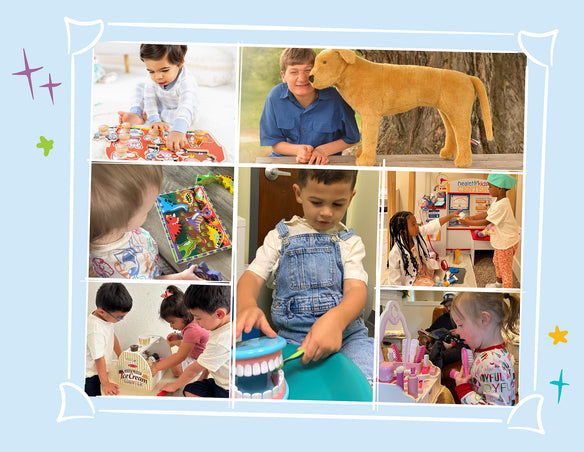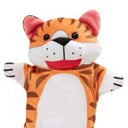One of the most rewarding aspects of our work at Melissa & Doug is hearing from parents, teachers, and therapists about how their children play with our inclusive toys – sometimes in ways we never imagined! Especially heartwarming are the stories of how our toys help children build confidence.

You’ve shared with us how Melissa & Doug toys have helped your kids unlock language and motor skills, overcome anxiety around doctor visits, make social-emotional connections, and so much more. Here’s a look at how inclusive toys can make a difference for children.
7 Ways Inclusive Toys and Open-Ended Play Help Kids Build Confidence
1. It can give kids confidence to face their fears
Role playing gives kids a safe space for trial and error. Pretend play empowers children to explore unfamiliar situations (going to the doctor/dentist, first day of school, flying on an airplane) and act out various scenarios. This helps them develop confidence as they learn to take risks, trust their instincts, and manage their responses to challenges.

Playing "doctor" and "dentist" can help kids overcome fears and make for successful and less stressful appointments
2. It lets kids develop a sense of independence and responsibility
Children love imitating the actions and behaviors of adults and others they see around them every day. It’s an essential part of their social and cognitive development, and helps them hone imitation skills that are needed for learning throughout their lives. Plus, it helps to create a sense of belonging.

Imitating grown-ups not only helps boost confidence but also builds a sense of independence and responsibility.
3. It helps kids find their passion and purpose
When kids engage in inclusive, open-ended role play, they’re not only developing their own creativity and storytelling ability, they are practicing for real-world scenarios that they’ll encounter later on in school and beyond. Pretend and role-playing are important tools in helping kids process big emotions, too. If your child gravitates towards a specific style of role play—for example, they wear their veterinarian costume everywhere and are always playing pretend with their stuffed animals or pets—that could be the first link in the chain to helping find their passion and purpose.

Photo courtesy of @theycallmestinkbug (Instagram)
A plush pal may be just what a child needs for an extra bit of confidence.
4. It helps kids feel supported and empowered
Inclusive, open-ended play with plush toys can help kids to feel supported, loved, and empowered. Plush toys may often be the first real “friends” that toddlers make in their lives, and it’s not uncommon for stuffed animals to become a child’s constant companion. Besides providing direct comfort and security, open-ended inclusive play with plush stuffed animals helps kids build social skills and empathy, practice their language skills, and develop their creativity and imagination.
5. It can give kids the sensory stimulation (or soothing) they may need
Sensory play where kids explore textures, make and listen to sounds, and see new colors, shapes, and objects helps them engage with the world. Or for some kids, sensory play can offer a needed soothing retreat from a stimulating world. Sensory play not only helps kids hone their fine and gross motor skills, it’s been shown to have a calming effect, especially on children who may need help self-regulating.
6. It can provide a fine motor skill-building challenge
Any toy that encourages kids to shake, pull, grasp, or pinch—that’s a toy that can help your child develop those all-important fine motor skills. Fine motor skills that are developed during play are building blocks for children to feed and dress themselves, write, and use more advanced tools as they grow up.

Confidence-building toys encourage kids to try . . . and try again while developing new skills.
7. It can be a tool for increasing learning and communication
Open-ended play is a great way for children to work on communication and problem-solving skills, often without even realizing it. Toddlers frequently learn best through repetition and imitation, and open-ended toys lend themselves perfectly to these play styles. It’s a big confidence boost, too, when a kid masters a new skill that they’ve been practicing with a toy. When kids are free to explore with toys in novel ways, they’re also practicing early problem-solving skills, especially if they use toys in ways that are different from the standard or expected way to play. Early communication often emerges during this kind of play as well, as kids might need to ask for help from an adult or may start narrating their own play.

Completing puzzles like these can help kids become more confident by boosting their vocabulary as they talk about the puzzle pieces. It also gives them the "I did it!" sense of satisfaction.
Melissa & Doug would love to hear more of how inclusive toys and open-ended play have helped your kids build confidence. Share your stories with us by tagging us on Instagram @MelissaAndDougToys #BUILDINGCONFIDENCE
NOTE: Every child is different. While we design our products to be as accessible and useful to as many children as possible, they are not designed to address specific medical or therapeutic concerns and your child may have a different experience from the children featured here.









